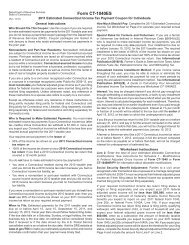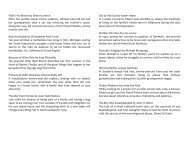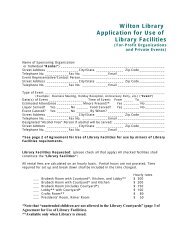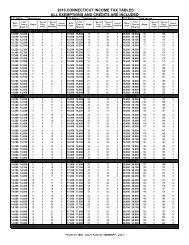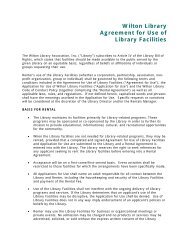CT-1040 Instructions, 2011 Connecticut Resident Income Tax - CT.gov
CT-1040 Instructions, 2011 Connecticut Resident Income Tax - CT.gov
CT-1040 Instructions, 2011 Connecticut Resident Income Tax - CT.gov
You also want an ePaper? Increase the reach of your titles
YUMPU automatically turns print PDFs into web optimized ePapers that Google loves.
Line 38: Other<br />
Use Line 38 to report any of the following modifications:<br />
1. Add back any treaty income reported on federal Form<br />
<strong>1040</strong>NR-EZ or Form <strong>1040</strong>NR if a nonresident alien. Enter<br />
the words “treaty income” in the space provided.<br />
2. Add back any loss or deduction of an enrolled member<br />
of the Mashantucket Pequot Tribe who resides in Indian<br />
country of such tribe or any loss or deduction of an<br />
enrolled member of the Mohegan Tribe who resides in<br />
Indian country of such tribe where the loss or deduction<br />
is derived from or connected with Indian country of<br />
the tribe. Enter the words “Mashantucket Pequot Tribe<br />
enrolled member” or “Mohegan Tribe enrolled member,”<br />
as the case may be.<br />
3. Add back any <strong>Connecticut</strong> income tax deducted on the<br />
federal income tax return to arrive at federal adjusted<br />
gross income. Do not add back any <strong>Connecticut</strong> income<br />
tax deducted on federal Form <strong>1040</strong>, Schedule A.<br />
4. Add back any expenses paid or incurred for the production<br />
(including management, conservation, and maintenance of<br />
property held for the production) or collection of income<br />
exempt from <strong>Connecticut</strong> income tax which were deducted<br />
on the federal return to arrive at federal adjusted gross<br />
income.<br />
5. Add back any amortizable bond premium on bonds<br />
producing interest income exempt from <strong>Connecticut</strong><br />
income tax which premiums were deducted on the federal<br />
return to arrive at federal adjusted gross income.<br />
6. Add back any interest or dividend income on obligations or<br />
securities of any authority, commission, or instrumentality<br />
of the United States which federal law exempts from federal<br />
income tax but does not exempt from state income taxes.<br />
7. Add back to the extent deductible in determining<br />
federal adjusted gross income, any interest expenses on<br />
indebtedness incurred or continued to purchase or carry<br />
obligations or securities (the income from which is exempt<br />
from <strong>Connecticut</strong> income tax).<br />
8. Also use Line 38 to report any additions to federal<br />
adjusted gross income required for <strong>Connecticut</strong> income<br />
tax purposes which are not listed on Lines 31 through 36.<br />
Line 39: Total Additions<br />
Add Lines 31 through 38 and enter the total.<br />
Subtractions From Federal Adjusted Gross <strong>Income</strong><br />
Enter all amounts as positive numbers.<br />
Line 40: Interest on U.S. Government Obligations<br />
Enter the total amount of interest income (to the extent<br />
includible in federal adjusted gross income) derived from<br />
U.S. <strong>gov</strong>ernment obligations, which federal law prohibits<br />
states from taxing (for example, U.S. <strong>gov</strong>ernment bonds such<br />
as Saving Bonds Series EE or Series HH and U.S. Treasury<br />
bills or notes).<br />
For Series EE U.S. Savings Bonds, you are entitled to include<br />
on Line 40 only the amount of interest subject to federal<br />
income tax after exclusion of the amounts reported on federal<br />
Form 8815. In general, you will report the net taxable amount<br />
on federal Form <strong>1040</strong>, Schedule B, or federal Form <strong>1040</strong>A,<br />
Schedule 1.<br />
Do not enter the amount of interest income derived from<br />
Federal National Mortgage Association (Fannie Mae) bonds,<br />
Government National Mortgage Association (Ginnie Mae)<br />
bonds, and Federal Home Loan Mortgage Corporation<br />
(Freddie Mac) securities. Federal law does not prohibit states<br />
from taxing interest income derived from these obligations<br />
and this interest income is taxable for <strong>Connecticut</strong> income<br />
tax purposes.<br />
Do not enter the amount of interest paid to you on any federal<br />
income tax refund.<br />
Line 41: Exempt Dividends From Certain<br />
Qualifying Mutual Funds Derived From U.S.<br />
Government Obligations<br />
Enter the total amount of exempt dividends received from a<br />
qualifying mutual fund that are derived from U.S. <strong>gov</strong>ernment<br />
obligations. A mutual fund is a qualifying fund if, at the close<br />
of each quarter of its taxable year, at least 50% of the value<br />
of its assets consists of U.S. <strong>gov</strong>ernment obligations. The<br />
percentage of dividends that are exempt dividends should be<br />
reported to you by the mutual fund.<br />
Do not enter the amount of dividend income derived from<br />
Federal National Mortgage Association (Fannie Mae) bonds,<br />
Government National Mortgage Association (Ginnie Mae)<br />
bonds, and Federal Home Loan Mortgage Corporation<br />
(Freddie Mac) securities. Federal law does not prohibit states<br />
from taxing income derived from these obligations, and this<br />
income is taxable for <strong>Connecticut</strong> income tax purposes.<br />
Example: A qualifying mutual fund pays a dividend of $100.<br />
Of the distribution, 55% is attributable to U.S. Treasury bills and<br />
45% to other investments. The amount reported on Line 41 is $55.<br />
See Policy Statement, 2005(2), <strong>Connecticut</strong> <strong>Income</strong> <strong>Tax</strong> on<br />
Bonds or Obligations Issued by the United States Government,<br />
by State Governments, or Municipalities.<br />
Line 42: Social Security Benefit Adjustment<br />
If you receive Social Security benefits subject to federal income<br />
tax, you may reduce or eliminate the amount of your benefits<br />
subject to <strong>Connecticut</strong> income tax. Spouses in a same sex<br />
marriage must recompute their federal adjusted gross income<br />
as if their filing status for federal income tax purposes were<br />
married filing jointly or married filing separately.<br />
Your Social Security benefits are fully exempt from<br />
<strong>Connecticut</strong> income tax if your required filing status is<br />
single or filing separately and the amount reported on Form<br />
Page 23



